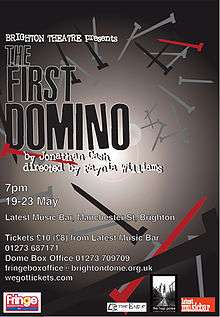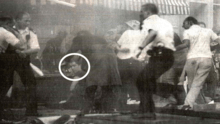The First Domino
| The First Domino | |
|---|---|
 | |
| Written by | Jonathan Cash |
| Date premiered | 19 May 2009[1] |
| Original language | English |
The First Domino is an English play about a fictional terrorist bomber, written by Jonathan Cash, who was injured in the 1999 bombing of the Admiral Duncan pub in Soho, London by David Copeland
In 1999, Cash was standing in the bar when the third and final nail-bomb exploded in a campaign targeting minorities. He received compensation, and used it to fund a university course in Dramatic Writing. Some years later, he developed a two-hander play about a convicted terrorist being interviewed in prison by a psychiatrist. It premièred at the Brighton Festival Fringe in May 2009, and received the Best Theatrical Performance Award. It was later adapted for radio.
In 2011, comparisons were drawn between the terror campaign, the play, and the Norwegian terrorism incident.
Background

The First Domino play takes its name from the domino effect, and was written as a response to a real-world nail bomb attack.[2]
In 1999, David Copeland, a Neo-Nazi and former member of the British National Party, who was found to have decorated his bedroom with Nazi symbols and collected news stories on racist attacks.[3][4] Copeland intended to stir up ethnic and homophobic tension with a series of bombs targeting the minority communities of London.[5] The first attack was in the largely black community of Brixton on Saturday, 17 April 1999. The second hit the Asian community of Brick Lane on Saturday, 24 April 1999.[6] The third took place at a pub in Old Compton Street, Soho – the heart of London's gay community.[5]
On Friday 30 April 1999, a sunny evening after work, Jonathan Cash – author of the play[3] – had agreed to meet two friends in the Admiral Duncan, as was usual for them.[7] While he waited, patrons noticed an unattended bag. The previous two bombs had made Londoners wary; although they had been described as race-hate attacks, police had issued a warning that a gay bar could be the bomber's next target, and The Yard – another pub in the area – had displayed a poster warning customers to be alert.[3] The Admiral Duncan bomb, a home made device of fertiliser and nails, exploded at 6:37 p.m.[7]
It was the loudest, most alien noise I have ever heard. It ripped through the building. I really can't say how long it lasted; a few seconds perhaps. I can't remember, but there was a crunch of something solid, something structural. But what I can remember is the acrid smell, the sulphurous dust. My ears were ringing, my eyes were smarting, the dust filled my nose making it hard to breathe.— Jonathan Cash, Pink News[7]

Three people died as a result of the blast (including a pregnant woman) and many more were seriously hurt,[4] including Cash, who was standing close to the bomb; he received injuries to his back and shoulder, and burns to his face and legs.[1][2]
David Copeland was convicted of murder on 30 June 2000, and given six concurrent life sentences.[8] He had been diagnosed by five psychiatrists as having paranoid schizophrenia.[9] In 2007, the High Court ruled that he must serve at least 50 years.[10]
Cash received financial compensation, and used it to fund an MA in Dramatic Writing at the University of Sussex, saying he "wanted to do something positive with the money".[1]
Cash perceived Copeland as wanting to be the first domino, setting off a race war.[4]
Plot
The opening scene shows a young man kneeling on a Union Jack, manufacturing a bomb, which is left menacingly on the stage.[11] We meet him some time later, in a top-security prison, convicted for terrorism. He is interviewed by a psychiatrist who is engaged in research on sociopaths for an academic paper. The bomber's belief system, incorporating violent racism and homophobia, is revealed – causing the audience to question their own beliefs.[11] A series of psychological games starts between the prisoner and the psychiatrist, which challenges the audience's conceptions. Secrets are gradually revealed, reality is distorted, and the play ends with a surprising twist.[12] It is a play about hatred, which illustrates how violence breeds more violence. The complex relationship between bomber and psychiatrist fails to result in a solution.[11]
Reception
A preview in The Guardian in May 2009 said it had "surprising twists [...] as the plot thickens",[1] and one reviewer said it was "one of the most honest and hard hitting plays I have seen."[13] The play received that year's Best Theatrical Performance Award.[14]
A representative of the Gay Police Association hoped the play would raise awareness; the GPA helped to raise money for producing it, and recollections from the police influenced the story.[1]
Development
It was several years after the bombing before Cash was able to write about the events with objectivity.[1] He wrote The First Domino as part of his M.A. Dramatic Writing course at the University of Sussex,[2] where he met Faynia Williams, who encouraged the development and directed the production.[1][2]
The play was produced by the Brighton Theatre and directed by Williams.[2] It was a two-hander about a fictional terrorist being interviewed by a psychiatrist in a top-security prison. Danny Seldon (who used to be a marine[1]) played the part of the terrorist, the doctor was played by Cary Crankson, and music was by Rory Cameron.[15][13] with "surprising twists".[1]
Cash and Williams' production company, Brighton Theatre, presented the play at Brighton Festival Fringe on 19 May 2009, close to the 10th anniversary of the bombing (though they state the date was coincidental).[1][14] It was described as "honest and hard-hitting"[13]
Cash was then commissioned by production company Unique (part of UBC Media Group) to rewrite the play for BBC Radio 3's series of single dramas The Wire. The completely re-imagined piece was first broadcast on Saturday, 9 October 2010.[14] The cast list included Toby Jones, Joseph Kloska, Claire Price and Struan Rodger.[14][16]
Less than a year later, Cash was quoted in The Guardian in a piece reacting to the 2011 Norway attacks as conclusions were reached about the similarities between David Copeland and Anders Breivik.[17] Cash said, "It has made me think about the words people use. How they create a landscape. When someone is being bigoted or homophobic, everybody should be asking questions."[17]
References
- 1 2 3 4 5 6 7 8 9 10 Ella Marshall (13 May 2009). "Jonathan Cash has written a play based around the Soho pub bombing". The Guardian. London. Retrieved 27 July 2011.
- 1 2 3 4 5 Emily-Ann Elliott (5 May 2009). "Bomb survivor writes Brighton play". The Argus. Retrieved 27 July 2011.
- 1 2 3 Simon Edge. "Look Back in Anger". Gay Times. Retrieved 30 July 2011.
- 1 2 3 "On This Day: Dozens injured in Soho nail bomb". BBC. 30 April 1999. Retrieved 27 July 2011.
- 1 2 "Outrage marks new departure not just for Norway but for Europe in general – The Irish Times – Mon, Jul 25, 2011". 25 July 2011. Retrieved 5 August 2011.
- ↑ Nick Hopkins, Sarah Hall (30 June 2000). "David Copeland: a quiet introvert, obsessed with Hitler and bombs". The Guardian. London. Retrieved 27 July 2011.
- 1 2 3 Jonathan Cash (30 April 2009). "Admiral Duncan bombing: The day my life changed forever". Pink News. Retrieved 30 July 2011.
- ↑ Buncombe, Andrew; Judd, Terri; and Bennett, Jason. "'Hate-filled' nailbomber is jailed for life", The Independent, 30 June 2000.
- ↑ Hopkins, Nick and Hall, Sarah. "David Copeland: a quiet introvert, obsessed with Hitler and bombs", The Guardian, 30 June 2000.
- ↑ Attewill, Fred. "London nail bomber must serve at least 50 years", The Guardian, 2 March 2007.
- 1 2 3 Nicholas Quirke. "Brighton Fringe 2009, The First Domino". Fringe Review. Retrieved 30 July 2011.
- ↑ "Jonathan Cash". The Playwrights Database. Retrieved 30 July 2011.
- 1 2 3 Howard Young (20 May 2009). "Honest & Hard Hitting Play Based on Real Issues & Difficult Topics @ Latest Music Bar". Brighton Magazine. Retrieved 27 July 2011.
- 1 2 3 4 "Programmes – The Wire, The First Domino". BBC Radio 3. Retrieved 27 July 2011.
- ↑ "Latest Homes Magazine » Archive » Living in Brighton: Rory Cameron". Retrieved 30 July 2011.
- ↑ "The First Domino". Unique production company, UBC Media Group. Retrieved 27 July 2011.
- 1 2 Hugh Muir (26 July 2011). "Hideously diverse Britain: Fighting the domino effect of intolerance". London: The Guardian. Retrieved 27 July 2011.
External links
- 10 Questions: An Interview with Jonathan Cash, Festival Previews blog